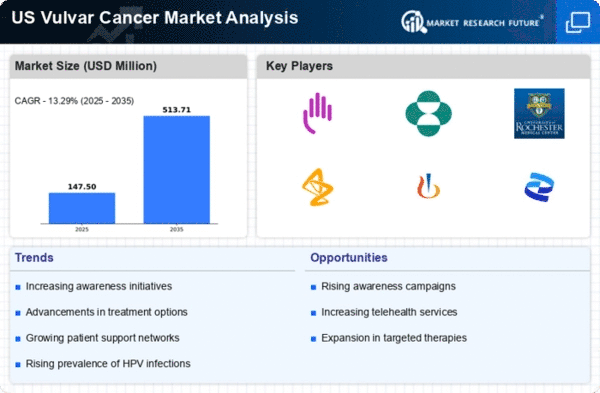Rising Incidence Rates
The vulvar cancer market is experiencing a notable increase in incidence rates, which appears to be a significant driver for market growth. According to the American Cancer Society, the estimated new cases of vulvar cancer in the US for 2025 are projected to reach approximately 6,000. This rising trend in cases may lead to heightened awareness and demand for treatment options, thereby expanding the vulvar cancer market. Furthermore, the increasing prevalence of risk factors such as HPV infections and smoking could contribute to this upward trajectory. As healthcare providers and patients become more informed about vulvar cancer, the market is likely to see an influx of innovative therapies and diagnostic tools aimed at addressing this growing health concern.
Advancements in Diagnostic Technologies
Recent advancements in diagnostic technologies are poised to transform the vulvar cancer market. Enhanced imaging techniques, such as high-resolution ultrasound and MRI, allow for earlier and more accurate detection of vulvar cancer. These innovations may lead to improved patient outcomes and increased survival rates, which could drive market growth. Additionally, the development of molecular diagnostic tests that identify specific biomarkers associated with vulvar cancer is gaining traction. Such tests can facilitate personalized treatment approaches, thereby enhancing the overall efficacy of therapies. As these technologies become more widely adopted, they are likely to play a crucial role in shaping the future landscape of the vulvar cancer market.
Regulatory Support for Innovative Therapies
Regulatory support for innovative therapies is playing a pivotal role in shaping the vulvar cancer market. The US Food and Drug Administration (FDA) has been increasingly proactive in expediting the approval process for new cancer treatments, particularly those that demonstrate promising results in clinical trials. This supportive regulatory environment encourages pharmaceutical companies to invest in the development of novel therapies for vulvar cancer. The potential for faster market entry of effective treatments may enhance competition and drive down costs, ultimately benefiting patients. As regulatory bodies continue to prioritize cancer research and treatment innovation, the vulvar cancer market is likely to experience significant growth.
Increased Awareness and Education Initiatives
Increased awareness and education initiatives regarding vulvar cancer are emerging as a critical driver for the market. Non-profit organizations and healthcare providers are actively working to disseminate information about the signs, symptoms, and risk factors associated with vulvar cancer. Campaigns aimed at educating women about the importance of regular gynecological check-ups and self-examinations are likely to lead to earlier detection and treatment. This heightened awareness may result in a growing patient population seeking medical intervention, which could subsequently boost the vulvar cancer market. As more individuals become informed about this condition, the demand for effective treatment options is expected to rise.
Growing Investment in Research and Development
Investment in research and development (R&D) within the vulvar cancer market is on the rise, reflecting a commitment to improving treatment options and patient care. Pharmaceutical companies and research institutions are increasingly allocating resources to explore novel therapies, including immunotherapy and targeted treatments. This trend is supported by funding from government agencies, which has seen a substantial increase in grants for cancer research. For instance, the National Cancer Institute has dedicated millions of dollars to studies focused on vulvar cancer. Such investments are expected to yield breakthroughs that could significantly enhance treatment efficacy and patient outcomes, thereby propelling the vulvar cancer market forward.

















